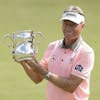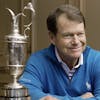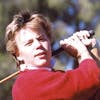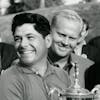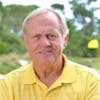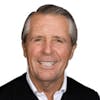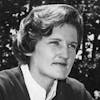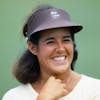Pat Bradley - Part 2 (The 1980 Peter Jackson and 1981 Women's U.S. Open)
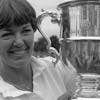
In this second installment of our four-part series with World Golf Hall of Fame member Pat Bradley, "FORE the Good of the Game" delves deeper into the remarkable career and personal insights of one of golf's greatest legends. Hosted by Mike Gonzalez and Bruce Devlin, this episode is a treasure trove of stories, laughter, and wisdom from a true icon of the sport.
Pat Bradley, with her hallmark candor and charm, recounts her journey through some of the most defining moments of her career, starting with her first professional win at the iconic Victoria Golf Club in Australia. The vivid details of this victory and the charming anecdote of her mother's celebratory cowbell ringing set a tone of familial love and support that underpins Bradley's entire career.
The episode then shifts to Bradley's impressive record, highlighting her astounding 31 LPGA tour wins, which ties her with Juli Inkster for 16th on the all-time list. She reflects on her incredible 312 top-ten finishes out of 617 tournaments, offering a window into her relentless consistency and competitiveness.
Listeners are treated to an in-depth discussion of Bradley's major championship triumphs, including the 1980 Peter Jackson Classic and her memorable win at the 1981 U.S. Open. Her detailed narration of the tournament, especially the final moments of her victory, is both thrilling and introspective, revealing her mental strength and strategic acumen.
Pat also opens up about the challenges she faced, including her fear of failure that paradoxically drove her to greatness. This episode is not just about the victories and accolades; it's a human story of resilience, passion, and the relentless pursuit of excellence.
This episode is a must-listen for golf enthusiasts and anyone inspired by stories of overcoming odds and achieving greatness. Join us as we celebrate the remarkable career of Pat Bradley, "FORE the Good of the Game."
Follow our show and/or leave a review/rating on:
Our Website https://www.forethegoodofthegame.com/reviews/new/
Apple Podcasts https://podcasts.apple.com/us/podcast/fore-the-good-of-the-game/id1562581853
Spotify Podcasts https://open.spotify.com/show/0XSuVGjwQg6bm78COkIhZO?si=b4c9d47ea8b24b2d
Google Podcasts https://podcasts.google.com/feed/aHR0cHM6Ly9mZWVkcy5idXp6c3Byb3V0LmNvbS8xNzM3Mjc1LnJzcw
About
"FORE the Good of the Game” is a golf podcast featuring interviews with World Golf Hall of Fame members, winners of major championships and other people of influence in and around the game of golf. Highlighting the positive aspects of the game, we aim to create and provide an engaging and timeless repository of content that listeners can enjoy now and forever. Co-hosted by PGA Tour star Bruce Devlin, our podcast focuses on telling their life stories, in their voices. Join Bruce and Mike Gonzalez “FORE the Good of the Game.”
Thanks so much for listening!
Music playing 00:00
Mike Gonzalez 00:10
Well we're certainly going to talk more about The Dinah Shore, we're going to talk about Colgate Palmolive and some of the other opportunities that provided you and your career, but okay, you got us to Q school, we're going to let you turn pro. So let me just recap, for our listeners, some of the statistics for Pat Bradley, which are quite impressive and as Bruce mentioned, 36 professional wins of which 31 were on the LPGA tour. That puts Pat tied for 16th on the all-time list, tied with Juli Inkster. The other thing that stands out Bruce, and we can kind of compare and contrast other guests like a Kathy Whitworth, but 55 second places.
Devlin, Bruce 00:56
Very similar to Kathy in lots of respects. She won 88 tournaments and had 95 seconds. So, you followed in her footsteps Pat.
Bradley, Pat 01:06
Well, I don't know about that Bruce, but she did set the standard. She and many of the players before me, the Betsy Rawls, the Marilyn Smith's, they set the standard of greatness. And I when I joined the tour I just focused on those great women. And wanted to walk side by side with them. And fortunately, things worked out. Now, I told you I had done some homework. And now to add to this, fellas, I found in, you know, the World Golf Hall of Fame. In my prime, I competed in 617 tournaments, posting 312 top-tens.,
Devlin, Bruce 02:08
Pretty fancy.
Bradley, Pat 02:10
And 208 of those events were top fives.
Devlin, Bruce 02:14
Yeah, that's great. Fabulous
Mike Gonzalez 02:17
I had that in my notes, Pat. And that's one of the things that just stands out is, you know, you come to play every day, my statement at the top, that boy oh boy, in a full third of your events you were in the top five.
Bradley, Pat 02:29
I know Mike. I mean, during the time of it, though, I didn't realize it. It's when you get off the rat race. When you get off the carousel, and you sit back, and you have a moment to reflect. I didn't realize that was happening. I mean, I realized I wasn't winning. You know, I played a lot. And you know, I couldn't light a candle, to Kathy Whitworth's 88 wins or to Mickey's 82 wins or Anika's 72. But, I mean, I held my own. And ,I'm very proud of my record. I was there to compete and to do the best I can. And the other interesting thing, fellas, and I don't know how this happened to me. But my M.O. in my game was fear of failing. It was not the joy of success, like you would see with a Lopez or a Sheehan or an Alcott. My M.O., for whatever reason, I don't know how this happened. But this is the torch I carried, I played out of fear of failing. And I wouldn't wish that on anybody it. It's a little bit of a burden. And I think it contributed to getting in my own way and losing more than I won. I think it contributed to me having an issue with my thyroid being under that pressure of excellence that I was trying to get, to maintain, want. But with that, I'm okay. I made it and it's all good. So listen, let's go back to the very first tournament you won as a pro and it wasn't in this country. Was it? No, it was in your country.
Devlin, Bruce 05:01
You went down to Melbourne, right? Victoria Golf Club.
Bradley, Pat 05:05
I did one of the most iconic clubs in all of Australia Victoria Golf Club. And I remember, it was a wonderful trip. And I remember, Bruce, we're driving to the Golf Course. And we're listening to the radio, Australian radio. And all of a sudden, there's a guy in a helicopter that, he's like, if anybody's in the water, get out of there now there are sharks in the water. And I'm like, what? So that's what we listened to when we were driving to the club. They were telling people to get out of the water. But anyway, yes, it was the Colgate Far East. And everything clicked that week. And I'll never forget, Bruce, on the 18th hole at Victoria Golf Club. I had a 50 foot putt and I putted that putt. And what I remember seeing, Bruce, is the putt hit the back of the hole. The last thing I saw was it popped out of the cup. And I thought, oh my god, I missed it. And then it went back into the cup. And I won. I beat Joyce Kazmierski by one shot. And you made a 50 footer on the last hole. I did! And to see that thing pop up, like, oh my god, it popped out of the hole. I missed it. And then it went back in. And that's when I called my family. And because of the time change, I called my mom and dad, and they were so excited that I had won my first event and my mom grabbed a cow bell. And she went out onto the porch and started ringing this bell early in the morning. And the neighbor's lights went up. And you're like, you know, Mrs.Bradley, what's the matter, what's happening? And she yells oh Pat just won first tournament in Australia.
Devlin, Bruce 07:30
Perfect.
Bradley, Pat 07:31
And then from that moment on, my mom rang the bell. every time I won.
Devlin, Bruce 07:37
She got to ring the bell quite often.
Bradley, Pat 07:39
She did. She did and now I'm ringing Keegn's bell. I have a bell for Keegan.
Mike Gonzalez 07:45
Ah, That's neat. Of course, you're referring to your nephew, Keegan Bradley, who has had great success on the Tour as well, including being the champion at the PGA Championship in 2011. At Atlanta Athletic Club. So you must be quite proud of him as well
Bradley, Pat 08:03
I am extremely proud Mike, I'm having a lot of fun watching him conquer his goals and achieve his goals. And, Keegan and I played a few times, when I would come back from playing on tour. And I honestly believe that I inspired my nephew Keegan to be inside the ropes like his Aunt, rather than outside the ropes as a teacher of the game like his Dad. You know, I really think Keegan wanted to be inside the ropes as a player rather than outside the ropes as a teacher. And, his dad gave him the great fundamentals of the game. And Keegan is working hard to perfect it.
Mike Gonzalez 09:06
You're talking about your brother Mark who was Keegan's father. You talked about your mother Kathleen, who was the bell ringer and you talked about your father Richard, who was the person that really inspired you to take up the game.
Bradley, Pat 09:20
Yes, that's exactly right.
Mike Gonzalez 09:22
We've got to get their names in there. So you beat the great Kaz in the Colgate. I'll tell you a short story. Do you remember Liz Kahn, the English lady that wrote the book about the LPGA history?
Bradley, Pat 09:34
Yes, I do remember Liz.
Mike Gonzalez 09:36
So, one of our guests., do you remember Gloria Ehret? Gloria suggested I get her book. So I ordered it on Amazon. I get a book. It's obviously a pre-owned book. I open up the first page. And it's addressed to Barbara, it says "To Barbara, our greatest fan" signed Joyce Kazmierski
Bradley, Pat 10:02
Ah, yes. Yep. Joyce was a great and she is a great gal. She was our astrologist After I beat her, Mike, she said my bio rhythms that week that I beat her were right on.
Mike Gonzalez 10:27
What else could she say?
Bradley, Pat 10:28
Well, I know it Yeah. She was our astrologist and the bio rhythms and she was always telling you what your bio rhythms were gonna be like?
Mike Gonzalez 10:42
Well, her name has come up a lot on this show, and it's because I think she had a lot of second places.
Bradley, Pat 10:49
I think yes, I think so.
Mike Gonzalez 10:51
Well, let's go to validation. Bruce in 1976.
Devlin, Bruce 10:55
Yeah, June 1976. The Girl Talk Classic, where you shot rounds of 72-73-72. And you won in a playoff and beat Bonnie Lauer, Sandra Post and Judy Rankin?
Bradley, Pat 11:14
Yes. I do remember that at Wykagyl. Wykagyl's a great Golf Course and we had a great time there. And I remember, Judy and Barney and Sandra. And Sandra and Bonnie, they backed out the first hole. And then I went to the second playoff hole against the great Judy Rankin. And I'm like Pat, if you're going to win this, you better stay focused, because it's Judy Rankin. And sure enough, I won on the second hole of sudden death with Judy. And it was not only, you know, beating Judy, at just being two years on tour. But of course, Wykagyl being the great course that it was a nice a great test. It was very satisfying.
Mike Gonzalez 12:17
How important was it to you to prove to yourself that 1975 victory at the Colgate was not a fluke.
Bradley, Pat 12:24
Yeah, it was a lot. And the the tough thing is guys, it doesn't count. It never counted on my journey to the Hall of Fame. Why? I don't know. Because most of the tour went. And of course, in today's world, there are a lot of tournaments that don't have 144 players and they all seem to count in your record or your resume. So that one still has me baffled Bruce.
Devlin, Bruce 13:02
Yeah, well. They change things around, don't they?
Bradley, Pat 13:07
Yeah. So it's listed but it never counted towards my journey to the Hall of Fame.
Devlin, Bruce 13:19
Well, you impressed me though, with your next win. Because you won by two shots at the Bankers Trust Classic. Do you remember who you beat... JoAnne Carner, Carol Mann and Kathy Whitworth. That had to be just a thrill to beat all three of them.
Bradley, Pat 13:40
I was pinching myself, I think Bruce still. you know, I mean, those those winds kind of validated my journey that you know, I did the right thing. And, I can play this game against the highest level. And, when I joined the tour, Bruce, I gravitated to these women. These were the women that were number one on the tour when I joined and if I'm going to beat the best, I gotta learn from the best. And so I watched and I gravitated and took notes on how these women the Rankin's, the Whitworth's, the Mann's the Carner's, how these women played the game and how they went about their day and learned from the best. If I'm going be the best, I gotta learn from the best. And these were the women that taught me.
Mike Gonzalez 15:05
Well apparently you took some good notes because I think that win then propelled you to a multi-win season in 1978, where you had three victories, starting out with the Hoosier Classic in Indiana by three over JoAnne Carner. And sorry, let's go ahead of that, you won the Lady Keystones at Hershey Country Club, by four over Jane Blalock and then went back to back the next week. And then followed that up with a fall win at the Rail Charity Classic at the Rail Golf Course by four over Sharon Miller. So pretty good year in 1978.
Bradley, Pat 15:42
Yep. And that's when I knew I was off and running and there was no looking back. I knew that I would never use my degree that I earned at Florida International University. Especially after that 1978. And I remember the Rail, the Rail cCassic in Springfield, Illinois. We had a little nickname for the Rail Classic, "there's no jail at the Rail." Which meant you could hit it six fairways over Bruce and still have a shot. And JoAnne Carner loved that tournament. She absolutely loved that tournament. And it was a lot of fun. And they were wonderful. It was a wonderful group of people that put that tournament on and welcomed us back each year.
Mike Gonzalez 16:47
Yeah, you could. You could certainly go low there, couldn't you?
Bradley, Pat 16:51
Oh boy, you could go low.
Mike Gonzalez 16:55
So you're kind of rockin and rollin? Three victories? 1978 you kind of skipped a year in 1979. What was going on?
Bradley, Pat 17:02
Yeah, you know, That's a good question. Fellas. I'm really not sure should have been something.
Mike Gonzalez 17:11
Well, maybe a lot of close calls, good performances, just didn't get...
Bradley, Pat 17:15
Well there's those 52 seconds or whatever it might have been.
Mike Gonzalez 17:21
But we pick it up then again in 1980 and in 1980 of course is the year when you're going to pick up your first major but let's start in Baltimore. You're playing at the Greater Baltimore Classic Pine Ridge Golf Course. And you meet another Hall of Famer by one Nancy Lopez in the final planning of this event.
Bradley, Pat 17:39
Nancy and I, we kind of went up against each other a lot. You know, in Hershey. We went up against each other in Rochester a lot. We went up against each other here in Baltimore. So yeah, Nancy was a tough rival. We respected each other's game. And, I brought the best out of her and she brought the best out of me. So we we had a great back and forth over the years.
Mike Gonzalez 18:19
Bruce, it's time to pick up major number one.
Devlin, Bruce 18:21
How about that boy? The Peter Jackson Classic, right?
Bradley, Pat 18:26
Yes. I think in that tournament, if our notes are correct, there were seven World Golf Hall of Famers in the top 10. And you beat JoAnne Carner by a shot shooting 15 under par. That's quite a score. And that was at St. George's Golf and Country Club. Yeah, another great Golf Course. And of course, you know, back then, fellas, the Canadian Open, the Peter Jackson, the DuMaurier Open. They were our majors. Of course, in the 2000's they wanted to line up the Women's British along with the men's British, but in my day, the British Open was not a major event in women's golf. And so the Canadian Opens, the Peter Jackson's, the DuMaurier's were our majors. And in 1980, to win that first major I see my first day round was 65. That's pretty impressive.
Mike Gonzalez 19:47
That's pretty good.
Devlin, Bruce 19:48
Really!
Bradley, Pat 19:50
That's a good start. But yes, to get that first major is always very, very different and to do it over JoAnne, hovering over you. The Great Gundy, Big Mama, that in itself is quite an accomplishment. So that was huge in 1980.
Mike Gonzalez 20:21
We had a chance to talk to Marlene Streit just last week on the show Pat and Marlene remembers the 1966 U.S. Women's Amateur where she was up against JoAnne in the finals, and JoAnne was bragging about how she drove her by 100 yards but didn't matter because Marlene won.
Bradley, Pat 20:41
Yep. It's not how you drive. It's how you arrive fellas.
Mike Gonzalez 20:46
There you go. I like that. I like that one. So, just for our listeners to remind everybody, it was 1979 when this tournament finally became a major. And before 1979, for a number of years, including early on in your career Pat, there were only two majors to compete for and that was the LPGA and the U.S. Open.
Bradley, Pat 21:08
Yes, that made that made it difficult to rack up your majors when there was only two. And, of course I feel very fortunate fellas that in 1986, when I won three of the four majors and then you add the Canadian Open, the Peter Jackson or the DuMaurier, I was able to achieve the Career Grand Slam in women's golf at that time. Those were our four majors and of course, Louise Suggs and Mickey Wright myself and of course, Annika, Juli Inkster and now Karrie Webb. Karrie's got five of them, because now they have the Evian which is now the fifth major. So yeah, to have the Career Grand Slam added to my resume and to be mentioned along with Louise Suggs and Mickey Wright. And of course, Annika and Juli, I mean, it's all good.
Mike Gonzalez 22:30
You can add Inbee Park to that list of who you would consider to be Career Grand Slam winners, but you were the first to win all of the modern majors.
Bradley, Pat 22:40
Yes, that is true. 1986 is when that moment, that achievement happened, Mike, and I'm very, very proud of it.
Mike Gonzalez 22:53
Well, let's come back to 1981. Talk about a couple of your wins there, including one that perhaps you're most proud of, you alluded to earlier, which is the Women's Open. But let's talk first Bruce about that early win in 1981.
Devlin, Bruce 23:08
You win the Kemper Open at Mesa Verde Country Club by five over Debbie Massey, that was a nice way to start the year off.
Bradley, Pat 23:20
It was Bruc, and again, Mesa Verde Country Club was very unique in that the 18th hole,Bruce, was a par three. A part three. And I remember it was not a short par three, I think I hit three iron into it. It was a little uphill. And it was a par three and trying to hold the three iron into an uphill par three. But I obviously did. And I ended up beating Debbie Massey, but the Kemper Open was very special to win it in California was a nice way to start the season.
Mike Gonzalez 24:14
And that's a tournament that three years later was Betsy King's first win. She just snipped it, I think.
Bradley, Pat 24:21
Yes. And you know, Betsy, bless her heart, Betsy it took Betsy seven years to get her first win. And once she got it, the floodgates kind of opened up Mike and she was off and running.
Mike Gonzalez 24:42
Yeah they sure did. It took her a while to learn how to win but she talked about the mindset change that happened and as you said, off she went.
Bradley, Pat 24:51
Yeah, yep. And that's all it takes is one moment and she was a great player.
Mike Gonzalez 25:01
Well, we mentioned to you Pat that Bruce and I now have an agreement with the USGA where they are going to archive all of these stories in perpetuity. And of course, they always love it when we talk about winners of USGA championships. So now we've come to the 1981. U.S. Open. This is at LaGrange Country Club, and a lot to talk about here. But the short story is, you prevailed by one over Beth Daniel, shooting rounds of 71, 74 and finishing the weekend 68, 66 for a nine under total.
Bradley, Pat 25:40
Yes, that was a defining moment. I mean, at a U.S. Open to shoot a 68 and a 66 on Sunday. I mean, I really kind of put an exclamation point on that win but the very first Open that I made the cut in was 1974 at LaGrange. Before that, I didn't sniff a qualifying, making the cut at an Open and I had played in a few prior to this. So to have that good moment, come up seven years down the road from 1974 to 1981. I mean, I came to LaGrange feeling good. I came to LaGrange, knowing that this Golf Course was good to me. And that this Golf Course would reward me because 1974 was the first time I ever made a cut at an Open but I had also mentioned that on Saturday night, the night before the Sunday round we had a tremendous thunder and lightning show. Woke me up at two, three in the morning coming down torrential rains. And so then you go to the Golf Course and here we are with Whitworth leading and never winning an Open. Of course Beth Daniel never winning an Open but Kathy was everybody's favorite. Everybody was rooting for Kathy Whitworth even I was rooting for Kathy. Cause she had never won an Open with all her wins. And then on the first hole, I hit driver, seven iron and almost holed out, Bruce, from the fairway. Tapped in and I heard a little voice say that something might be happening today. Hang in there. So I go along and again, I'm rooting for Kathy myself. And then at the turn Bruce, I'm like, I'm still in this thing. And all of a sudden my focus switched from Kathy to myself and then the backside you know, I just played some great golf, chipping in on one hole, making a 70 footer on the 16th hole and then Kathy had slipped by this time. And now it was between Beth and I and of course Beth was a USGA girl. She was Curtis Cup she was U.S. Amateur. And I was this country bumpkin from Westford, Massachusetts, who no one really knew, basically, nationally. And then on on 18th, I hit a drive, Beth hit a great drive. I couldn't go for the green in two, so I hit down to the fairway. And Beth hit such a great drive that she could get there in two. But she over hit the shot and it went left and she was pin high. But over by a bunker, not in the bunker but by a bunker. And then I was about 70 yards short the green and I took out my sand wedge. And guys, I remember seeing the shot, standing over it. But I don't remember swinging it. I do not remember swinging, but I do remember seeing the ball in the air. And it landed about two and a half, three feet, Bruce from the hole. So I was thrilled, I go up there, I marked my ball. Beth makes a chip shot that if it had rolled one half of an inch, it would have gone in for an eagle Bruce. And she would have had an eagle. And then I had that two and a half, three footer. And again, I remember this little voice in my head, say to me now Pat, do not dwell on this putt, get over it and stroke it, and hit it Bruce, which I did. And it went in the hole and I ended up beating Beth by one shot. And if Beth had made that eagle, we would have been on a Monday playoff. So it was a moment in greatness. My family, my dad was so excited. I flew home to Boston that night after the event. And I had a state police escort from Logan Airport to my home. I had people come to the airport with signs and posters. Congratulations. That's when you could get past security, back in those days. And the State Police gave me an escort to my home in Westford. And, you know, had a great celebration with my family. And of course, my dad, you know, that old saying, you know, where you're with your dad and you know, he might say, oh, Pat, this is a putt for the Women's U.S. Open. And sure enough, it was a life dream. It had come true. Because I had that moment with my dad when I was at the Golf Course with him and of course he just always admired the greatness of the USGA and everything and I never was a Curtis Cupper. I never made it through the U.S. Amateur. So, to to win, my national title of Golf was huge.
Mike Gonzalez 32:42
So you mentioned Kathy Whitworth holding the lead after 54 Pat, she was the co-leader after each of the first two rounds then led by one. And to your point about her being such a crowd favorite at the time. Of course, this was probably her best chance to win a U.S. Open which she never won. But Donna Caponi, after that third row was quoted as saying, and by the way, a two-time Open champion herself said, if Kathy Whitworth wins, I'll probably get as drunk as a skunk.
Bradley, Pat 33:16
Oh, I mean, exactly. I mean, they were ready to hand Whitworth the trophy on Saturday night. They were hoping and wanting her to win, which I understand. I mean, it's hard to believe that somebody of Whitworths record of 88 wins or Beth Daniel's wins or Lopez's wins, and they never won a U.S. Open. It's amazing. It is amazing.
Mike Gonzalez 33:52
Well, that was one, certainly one regret that we heard Kathy share with us when we had a chance to visit with her was not winning the U.S. Open. She did finish third and during that tournament with her winnings there at that U.S. Open at LaGrange she became the first to ever go over a million in career earnings. Of course, the lady we're talking about today with Bruce, Pat Bradley was the first to go over the next few clip levels two, three and $4 million, which we'll get to but Pat's 279 set a new scoring record. I think the previous year, Amy Alcott had shot eight under, of course Pat shot nine under here, but she also broke by five shots, the total score record 279 was beating Amy's 1980 record by by five shots. There were eight World Golf Hall of Famers in this top 10 So you were beating some pretty marvelous, talented golfers.
Bradley, Pat 34:53
It was a great week, Mike. One that I still cheris every moment. LaGrange was great. It was a great test. It tested all my equipment. But in today's world guys, LaGrange is just not long enough for the kids today. I thought we might go back after 1981, sometimes you go back every seven years or 10 years. But, the young ladies today, they gotta go to Pebble Beach now.
Mike Gonzalez 35:42
So what changed for you coming onoff this win? Well, first of all, where would you rate it amongst all your individual successes? Where would you rate this win?
Bradley, Pat 35:50
This one's the top. This one is the top. This is the one that when you're little, you think about when I was 11, when I was 15, this is the event that you think about winning is your national title, your national event, your national title of golf, your national Open. And so this one here ranks because it's usually two. And it's usually the toughest Golf Course you can play. The rough is up, the fairways are narrow, the fairway are hard and firm, the greens are hard and firm, you never get above an Open green. You know, don't go above the pin, at an Open. It's usually the toughest field. And, it's open. It's open to everyone who qualifies. And, just like Catherine Lacoste, she won an amateur back in her day. It's not the usual characters that you play against. It's an array of different people, different players from around the world.
Devlin, Bruce 37:27
Well, I know Beth Daniel finished second there. And then that propelled you to a fabulous year in 1983, winning four golf tournaments. And after beating Beth at the Open your beat her again in the Mazda Classic by seven shots. And then you beat her in the playoff later in the year at Columbia Savings Classic. So she was she was hoping you'd stay at home.
Bradley, Pat 37:55
Yeah, I mean, Beth wasn't talking to me for a while there. Yeah, it's funny, guys, as I look back at these moments. Yeah, I didn't realize Beth bore the brunt of a few of my wins. And of course, she is just a great player, Hall of Famer and to be able to walk beside a Beth Daniel at any time, on a fairway is pretty special.
Mike Gonzalez 38:33
So we talked about the four wins in 1983. And then sort of your next best chance, I think, was coming into that 1984 Dinah Shore. You started the year with a close call losing a playoff there to Juli Inkster.
Bradley, Pat 38:49
Yeah, there's a story behind this guys. And it was a tough one. This was probably one of the toughest losses I ever felt on Tour. I was leading the Dinah Shore the last day. I had just made a great six foot par putt on the par 3 14th hole, the little par three down the hill over the water. And, you know, I made that six footer and I'm marching to the 15th tee. And someone with NBC tells me I have to hold up for about four or five minutes while they show some of the Pro-Am that was held earlier in the week. And I said what? Oh yeah, we just need you to hold up here, not anybody else. The groups in front of me all kept playing. My group was told to hold up. The producer of NBC was Larry Cirilo.
Devlin, Bruce 40:18
Yes, he was.
Bradley, Pat 40:19
And he made the call that I my group had to wait while they show clips of the Por-Am. Well, as you know, fellas, Golf is a game of momentum.
Devlin, Bruce 40:36
Yes, it is.
Bradley, Pat 40:37
And I had the momentum until that moment. And then I bogeyed. I don't know three out of the last five holes. And Juli Inkster ended up winning. And it still affects me to this moment.
Mike Gonzalez 40:58
And you took Larry Cirilo off your Christmas card list?
Bradley, Pat 41:02
Yes I did. Yes, I did.
Mike Gonzalez 41:06
So in retrospect, Pat, because obviously, as you get older, you develop perspective, you get us maybe a stronger mind and so forth. In retrospect do you think in another few years, like in 1986, or in 1991? Would you have handled that differently you think?
Bradley, Pat 41:29
Guys, I don't think so. Who would stop? Would you stop Tiger Woods? I mean, would you tell Tiger Woods to sit a minute, on his way to a major.No. But anyways, guys, I took the high road as best I could. And in 1986 I won The Dinah Shore, so I was rewarded. I was rewarded for taking the high road in that moment. And, you know, I also was rewarded by getting a contract with Nabisco Dinah Shore, for that moment. But, yeah, guys, it was tough. I still remember it to this day. I can still see myself going to that tee and then TV coming up to me and saying, "You gotta wait a minute." I didn't know who to turn to. Where was the official? Who instructed these people to tell me to stop what I was doing? I still don't understand the moment. But that Larry Cirilo, I don't know I you know, anyways, I'll never forget that guy.
Mike Gonzalez 43:08
Thank you for listening to another episode of FORE the Good of the Game and please, wherever you listen to your podcast on Apple and Spotify, if you like what you hear, please subscribe, spread the word and tell your friends. Until we tee it up again, FORE the Good of the Game, so long everybody.
Music playing 43:27
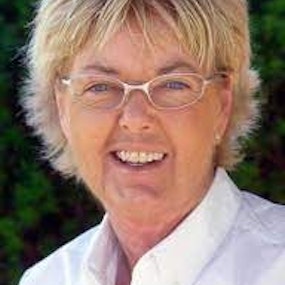
Bradley, Pat
Golf Professional
There has not been a more consistent performer or dedicated individual in Ladies Professional Golf Association history than Pat Bradley. This is a woman who made it on course management, patience and dogged determination, who experienced the highest of highs and the lowest of lows, and then came back to become the 12th woman enshrined in the LPGA Hall of Fame. “Commitment was the key,” Bradley said. “You can have success, failure, setback and defeat, and rise above it.”
During her prime, Bradley competed in 627 tournaments, posting 312 top-10 finishes, with 208 of those in the top five. She became the first woman golfer to surpass the $2 million (1986), $3 million (1990) and $4 million (1991) marks in career earnings and was the first woman to win all four of the modern Major Championships. In 1986, she won the Nabisco Dinah Shore, the LPGA Championship, the du Maurier and finished fifth at the U.S. Women’s Open, three strokes out of the Jane Geddes-Sally Little playoff.
That was the year that defined Bradley’s career. “I have been a very consistent and very good player, but I really believe that in 1986 I was tapped to be a little bit more distinguished than the other players,” Bradley said. “I think somewhere, someone up above picked me to have a year that will go down in golfing history and will make me just a little more special than other people. I honestly wish everyone could experience what I did in that dream-come-true year. I was invincible.”
“You can have success, failure, setback and defeat, and rise above it.”
After every one of he…
Read More
New to FORE the Good of the Game?
Here are some great episodes to start with. Or, check out episodes by topic.














